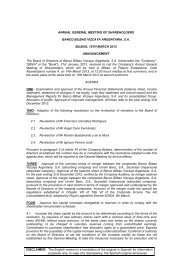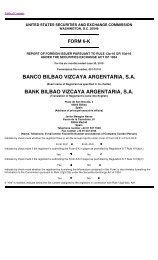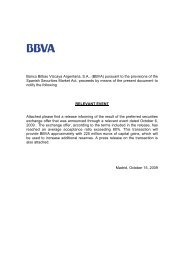BANCO BILBAO VIZCAYA ARGENTARIA, S.A. AND ... - BBVA
BANCO BILBAO VIZCAYA ARGENTARIA, S.A. AND ... - BBVA
BANCO BILBAO VIZCAYA ARGENTARIA, S.A. AND ... - BBVA
Create successful ePaper yourself
Turn your PDF publications into a flip-book with our unique Google optimized e-Paper software.
IFRIC 17 – Distributions of non-cash assets to owners<br />
This new interpretation stipulates that all distributions of non-cash assets to owners must be valued at fair<br />
value, clarifying that:<br />
• The dividend payable should be recognized when the dividend is appropriately authorized and is no<br />
longer at the discretion of the entity.<br />
• An entity should recognize the difference between the dividend paid and the carrying amount of the<br />
net assets distributed in profit or loss.<br />
IFRIC 18 –Transfer of assets from customers<br />
This clarifies the requirements for agreements in which an entity receives an item of property, plant, and<br />
equipment from a customer which the entity must then use either to connect the customer to a network or to<br />
provide the customer with ongoing access to a supply of goods or services, or both.<br />
The basic principle of IFRIC 18 is that when the item of property, plant and equipment meets the definition of<br />
an asset from the perspective of the recipient, the recipient must recognize the asset at its fair value on the<br />
date of the transfer with a balancing entry in ordinary income in accordance with IAS 18.<br />
b) ST<strong>AND</strong>ARDS <strong>AND</strong> INTERPRETATIONS ISSUED BUT NOT YET EFFECTIVE FOR THE GROUP AS<br />
OF JUNE 30, 2010<br />
New International Financial Reporting Standards together with their interpretations (IFRIC) had been<br />
published at the date of close of these consolidated financial statements. These were not obligatory as of<br />
June 30, 2010. Although in some cases the IASB permits early adoption before they enter into force, the<br />
Group has not done so as of this date.<br />
The future impacts that the adoption of these standards could have not been analyzed to date.<br />
IAS 24 Revised – Related party disclosures<br />
This amendment to IAS 24 refers to the disclosures of related parties in the financial statements. There are<br />
two main new features. One of them introduces a partial exemption for some disclosures when the<br />
relationship is with companies that depend on or are related to the State (or an equivalent governmental<br />
institution) and the definition of related party is revised, establishing some relations that were not previously<br />
explicit in the standard.<br />
This amendment will apply for years beginning after January 1, 2011. Early adoption is permitted.<br />
IAS 32 - Classification of preferred subscription rights<br />
The amendment to IAS 32 clarifies the classification of preferred subscription rights (instruments that entitle<br />
the holder to acquire instruments from the entity at a fixed price) when they are in a currency other than the<br />
issuer's functional currency. The proposed amendment establishes that the rights to acquire a fixed number<br />
of own equity instruments for a fixed amount will be classified as equity regardless of the currency of the<br />
exercise price and whether the entity gives the tag-along rights to all of the existing shareholders (in<br />
accordance with current standards they must be posted as liability derivatives).<br />
This amendment will apply for years beginning after February 1, 2010. Early adoption is permitted.<br />
IFRIC 14 Amended – Prepayment of Minimum Funding Contributions<br />
The IASB issued an amendment to IFRIC 14 to correct the fact that, under the current IFRIC 14, in certain<br />
circumstances it is not permitted to recognize some prepayments of minimum funding contributions as<br />
assets.<br />
This amendment will apply for years beginning after January 1, 2011. Early adoption is permitted.<br />
IFRIC 19- Settlement of financial liabilities through equity instruments<br />
In the current market situation, some entities are renegotiating conditions regarding financial liabilities with<br />
their creditors. There are cases in which creditors agree to receive equity instruments that the debtor has<br />
issued to cancel part or all of the financial liabilities. IFRIC 19 has issued an interpretation that clarifies the<br />
posting of these transactions from the perspective of the instruments issuer, and states that these securities<br />
must be valued at fair value. If this value cannot be calculated, they will be valued at the fair value of the<br />
38
















